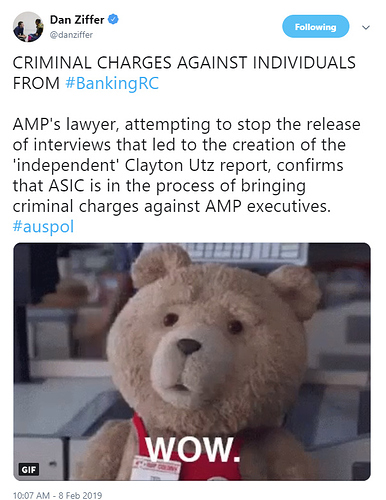From the letter (emphasis added):
"In our view, a properly constituted inquiry must have several significant characteristics. It should be led by an eminent and respected ex-judicial officer. Its terms of reference should be thoughtfully drafted and free of political influence. Its scope should be sufficient to cover the community’s core concerns which include banking, insurance, superannuation and non-ADI [authorised deposit-taking institution] finance providers.
"Further to avoid confusion and inconsistency, the inquiry must to the most practical extent replace other ongoing inquiries.
"It is vital that the terms of any inquiry consider the many reviews and inquiries that have been conducted into the banking sector in recent years; the significant government and industry-led reforms that have been and will shortly be implemented; the 44 recommendations made in the Financial System Inquiry in 2014; and the broad and positive contribution that banks make to the Australian economy and to millions of customers and shareholders.
No threats implicit in the last item.
This draft letter raises some serious concerns about how close the banks were to the government in developing the Royal Commission’s terms of reference, and the link by @PhilT to Michael Pascoe’s article about insider trading (good to see Pascoe is still around and still writing) raises even more concerns about the whole inquiry.
Looking at the letters patent that established the Royal Commission raises further questions. (Not sure why I didn’t do this at the beginning.) The first two paragraphs state:
WHEREAS Australia has one of the strongest and most stable banking, superannuation and financial services industries in the world, which performs a critical role in underpinning the Australian economy.
AND Australia’s banking system is systematically strong with internationally recognised and world’s best prudential regulation and oversight.
That’s not putting much pressure on the Commissioner, is it?
Then there’s clause (k):
We direct you to have regard to the implications of any changes to laws, that you propose to recommend, for the economy generally, for access to and the cost of financial services for consumers, for competition in the financial sector and for financial system stability
Spells out the rules quite nicely, while the last four clauses say ‘and be quick about it’.
One is left wondering if this is the Royal Commission for the Banking Industry. Certain non-bank institutions have lost out big-time, while the banks are sitting fairly comfortably - with the exception of some possible lawsuits that will no doubt be vigorously defended with their shareholders’ money.



